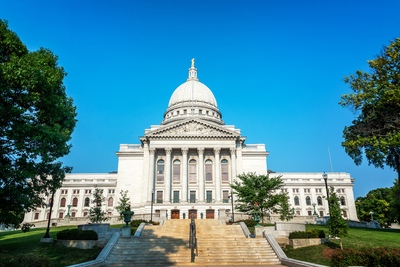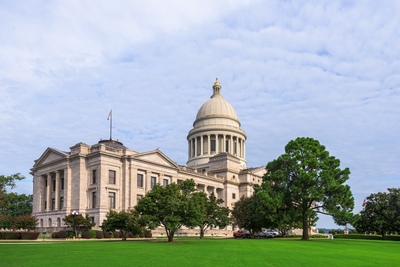
Elections & Campaigns
2026 State Elections Could Reshape Trifecta Control (States to Watch)
February 5, 2026 | Bill Kramer
November 5, 2018 | Max Rieper
Georgia was once a reliably Democratic state, but as the two parties shifted ideologically, the state went from Democratic control of both chambers of the legislature and the governorship in 2002 to Republicans controlling all three every year since 2004. Republican gubernatorial nominee Brian Kemp hopes to continue 16 years of GOP leadership in the governorship, but he faces an unexpected challenge from Democratic nominee Stacey Abrams, who is vying to become the state’s first African American governor.
Democratic nominee: Stacey Abrams
Age: 44
Resides: Atlanta
Bio: Abrams was born in Madison, Wisconsin, but grew up in Gulfport, Mississippi, and attended high school in Atlanta. She graduated from Spelman College, magna cum laude, earned a Master of Public Affairs at the University of Texas, and a law degree from Yale University. In college, she worked for Atlanta Mayor Maynard Jackson and interned at the U.S. Environmental Protection Agency.
Abrams worked as a tax attorney before her appointment as deputy city attorney for Atlanta. In her free time, she wrote award-winning romance novels and started several businesses, including one that produced bottled water for babies and a financial services firm for small businesses. She won a seat in the Georgia House of Representative in 2006 and was named House minority leader in 2011, becoming the first woman to lead either party in the Georgia General Assembly.
She served on several criminal justice committees and task forces and helped shape legislation that Governor Nathan Deal (R) signed to divert nonviolent offenders away from prison and into accountability courts and programs. She helped defeat a tax increase on low- and middle-income families and claims to have worked to preserve funding for education programs.
In 2013, she founded the New Georgia Project, a nonprofit focused on driving up voter registration in minority populations. The effort has produced 250,000 new registrations over the years. She has been paid nearly $500,000 over three years from the two voter-registration organizations she founded, but she will not disclose where the money to fund the organizations came from.
Abrams won the Democratic primary in a landslide, defeating state representative Stacey Evans with 76 percent of the vote.
In April, Abrams revealed she owes the IRS more than $50,000 in back-taxes, and has over $170,000 in credit card and student loan debt, explaining the tax deferrals were due to her father’s cancer treatment.
She is unmarried with no children.
Republican nominee: Brian Kemp
Age: 55
Resides: Athens
Bio: Brian Kemp grew up in Athens and graduated from the University of Georgia. His grandfather, Julian H. Cox Sr., was a Georgia state legislator. Kemp entered politics in 2002 after a career in real estate. He won election to the Georgia State Senate that year but lost a runoff election in a bid to become agriculture commissioner in 2006.
In 2010, Governor Sonny Perdue (R) appointed Kemp as secretary of state. Kemp won election to a full term later that fall, with a successful re-election bid in 2014. Under Kemp, the number of voter registrations increased from 5.8 million to 6.7 million and he implemented online voter registration, a mobile app, and a student ambassador program to encourage voter registration. In 2014, Kemp launched an investigation into Abrams’ voter registration efforts that resulted in 85,000 new applications, but he found no fraud by her organization.
In the lead up to the 2016 elections, Kemp declined help from the Obama Administration to secure voting systems from potential cybersecurity risks from Russia, criticizing the effort as "blow[ing] a lot of things out of proportion." A 2017 indictment of 12 Russians officials alleged there was an operation targeting election websites in Georgia counties.
Activists sued Kemp in May for not having paper ballots to verify electronic votes. Days after the suit was filed, election officials wiped two election servers, though Kemp insisted it was in accord with standard procedures and no election data lost. Security researchers later found vulnerabilities that allowed them to access passwords and voter registration files, fueling another lawsuit.
Kemp is also being sued for holding up 50,000 voter registrations, 80 percent of which are from African American, Latino, or Asian American residents. At issue is the “exact match” law, passed by the legislature, which requires the secretary of state to pause voter applications if they don’t exactly match existing records. In the week before the election, a federal judge ruled the law was too strict, allowing over 3,000 individuals to resolve discrepancies by showing proof of citizenship. In 2014, Kemp’s office erroneously canceled 8,000 voter registrations due to a “technical error” before the primary elections. Kemp has allegedly canceled 1.4 million voter registrations since he took over.
Kemp announced his candidacy for governor in March 2017, entering a crowded six-person field in the Republican primary. Neither of the top two candidates, Kemp and Lt. Governor Casey Cagle, could surpass the necessary 50-percent threshold of the vote, so they headed to a runoff that turned into a bitter contest. Cagle called for criminal investigations into donations Kemp received from businesses he regulated as secretary of state and blasted Kemp for “dirty tricks” and a sexist attack on a Cagle supporter. A leaked secret recording of Cagle being candid about issues and voters, plus President Donald Trump endorsing Kemp, helped Kemp win the primary with 69 percent of the vote.
Kemp met his wife Marty in high school and they have three teenage daughters.
Issues: The contrast between the two candidates “could not be sharper,” according to Emory University political science professor Alan Abramowitz. Kemp has run on an agenda similar to that of Trump, railing against illegal immigration, calling for a ban of sanctuary cities, and denying in-state tuition for undocumented students.
Abrams has sought to inspire voters “who share our values” rather than spending resources to convert Republican-leaning voters. She has focused on education, proposing a clawback of $100 million in tax credits for private schools and using the money to reduce class size and provide more resources for counselors, teacher pay, and pensions. She proposes $350 million for scholarships to make quality child care more affordable, create tax credits for teachers in early childhood jobs, and expand child care options in rural areas.
Kemp plans to increase teacher pay by $5,000, using a projected budget surplus to pay for the $600 million plan. He would continue an incentive program for quality child care centers, streamline literacy programs, and dismantle the Common Core K-12 education standards. Both candidates agree on less standardized testing.
Kemp’s economic plan focuses on less regulation and lower taxes. He wants a cap on state spending to limit growth in the budget. He has proposed eliminating income taxes on retirement pay for military veterans. Abrams has proposed a number of smaller economic proposals, such as a "cradle to career" savings plan to provide an initial investment and account for children of working poor families to cover post-secondary education expenses. She wants to enact an earned income tax credit costing $150 million, which she would pay for through closing tax loopholes. She has called for 22,000 apprenticeships to provide alternative career paths to college and wants the state to invest $10 million in capital for small businesses and start-ups.
Abrams has backed off her promise to repeal tax cuts on top rates passed earlier this year, as she now concedes it won’t be feasible.
Kemp originally criticized a tax break on jet fuel for Delta Air Lines when lawmakers killed the incentive in February after Delta ended its discount program for NRA members. But this summer, Deal suspended all tax collections on jet fuel, a move both Kemp and Abrams supported. Both candidates support Deal’s efforts to land Amazon’s new headquarters through tax incentives.
Abrams has made Medicaid expansion a popular campaign theme, arguing she can convince a Republican-led legislature to approve an expansion. Kemp had supported Medicaid expansion with work requirements as a state legislator but now opposes any expansion. He argues it would cost too much, with estimates putting the price tag at $246 million to $468 million for 473,000 uninsured residents. Kemp supports “free-market based health care reform” and a repeal of the Affordable Care Act. He has also proposed investing in the rural hospital tax credit program and requesting federal waivers to help stabilize insurance premiums.
Abrams wants to build on the criminal justice reforms enacted under Deal, proposing to decriminalize possession of small amounts of marijuana and ending cash bail. She wants to end the death penalty and expand the “ban the box” program to make it easier for released inmates to land jobs. Kemp has proposed a “stop and dismantle” plan to create a street gang database and a gang unit within the attorney general’s office.
Campaign: Kemp has described himself as a “politically incorrect conservative” who drew some flak for an ad that showed him pointing a shotgun at a teenage boy interested in dating one of Kemp’s daughters and an ad where he claimed his pickup truck was “to round up criminal illegals.” Kemp has criticized Abrams for being too liberal for Georgia and her vote on a sex-trafficking bill.
Abrams has stressed her work with Republicans and has called Kemp out for misleading ads.
She came under fire for burning the Georgia state flag in a 1992 protest over the Confederate battle flag symbol in the state flag. She has been accused of taking higher per diem payments than other House members.
Democrats have hit Kemp for a lawsuit over a $500,000 loan he personally guaranteed for an agricultural business in which he invested.
Voting rights have been a subject of debate throughout the campaign, with Kemp accusing Abrams of encouraging undocumented immigrants to vote, while Abrams has accused Kemp of suppressing votes in his role as secretary of state. Leaked audio from Kemp revealed he was concerned about Abrams’ voter turnout efforts. Abrams has been joined by former President and Georgia Governor Jimmy Carter in calling for Kemp to resign as secretary of state, arguing that he has a conflict of interest overseeing the election in which he’s running. Kemp has said he will not recuse himself if the race goes to a recount. Days before the election, Kemp launched an investigation into the Georgia Democratic Party for an alleged “hacking” attempt into the voter registration system.
Abrams has been a high-profile candidate, appearing on the cover of TIME magazine, garnering support from celebrities like Oprah Winfrey and Will Ferrell, and appearing at a rally with former President Barack Obama. Kemp has rallied his base with separate appearances at rallies with Vice President Mike Pence and Trump. Each candidate has raised well over $16 million in the general election, making this the costliest campaign in state history.
Recently, Democrats have anticipated Georgia becoming a more competitive state due to changing demographics. Hillary Clinton made progress, turning some Atlanta suburbs blue, though she slightly underperformed versus Obama overall in the state. African-American voter turnout surged in the primary elections for Abrams. Libertarian candidate Ted Metz is polling in the single digits, but he could have a large impact in a very close race. If neither candidate garners 50 percent of the vote, the top two candidates will head to a runoff election on December 4.
|
Date of poll |
Polling organization |
Commissioned by |
Result |
|
7/27 - 7/29 |
Gravis Marketing |
Abrams 46 Kemp 44 |
|
|
8/26 - 9/4 |
Atlanta Journal-Constitution |
Abrams 45 Kemp 45 |
|
|
9/17 - 9/20 |
Stacey Abrams campaign |
Abrams 48 Kemp 42 |
|
|
10/1 |
Landmark Communications |
Kemp 48 Abrams 46 |
|
|
10/3 - 10/8 |
WXIA 11 Alive |
Kemp 47 Abrams 45 |
|
|
9/30 - 10/9 |
Atlanta Journal-Constitution |
Kemp 48 Abrams 46 |
|
|
10/14 - 10/18 |
NBC News |
Kemp 49 Abrams 47 |
|
|
10/28 - 10/29 |
Fox 5 Atlanta |
Abrams 48 Kemp 47 |

February 5, 2026 | Bill Kramer

February 4, 2026 | Maggie Mick

January 23, 2026 | Andrew Jones